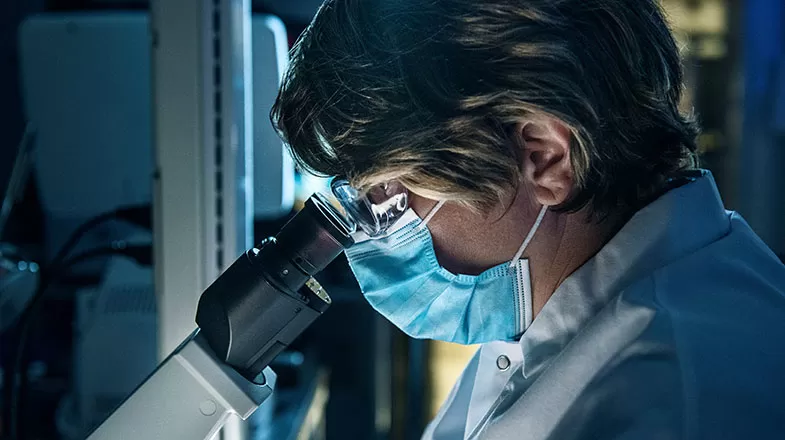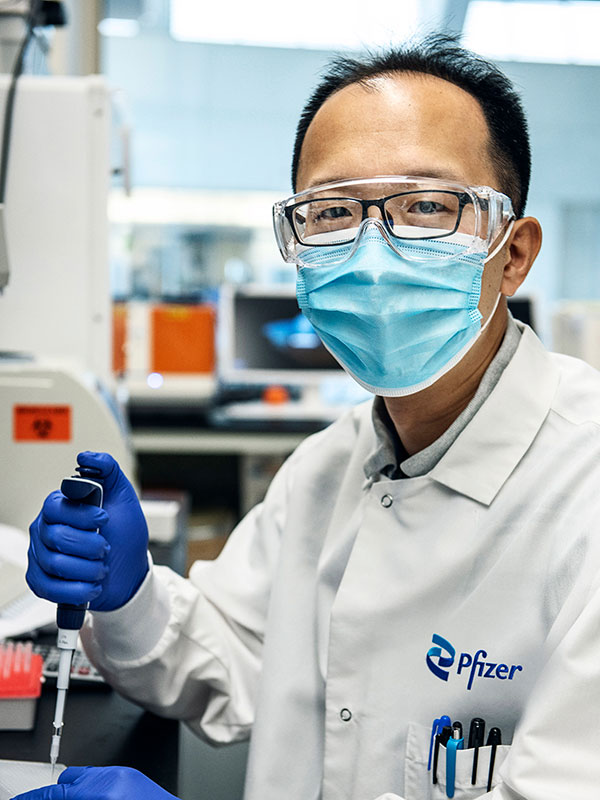- Science
- Clinical Trials
- Guide to Clinical Trials Your participation makes a difference
- Clinical Trials in Children Designed to improve kids' health
- Data and Results Sharing our Results
- Integrity and Transparency Building Trust
- Diversity Equity and Representation
- Plain Language Study Results Trial Result Summaries
- Expanded Access & Compassionate Use Possible Treatment Options
- Find a Trial
- Areas of Focus
- Rare Disease Smaller populations but big impact
- Internal Medicine Extending lifespans worldwide
- Inflammation & Immunology Treatment at the molecular level
- Vaccines Preventing the spread of infections
- Oncology The science of optimism
- Anti Infectives Combatting an evolving risk
- Areas of Innovation
- Gene Therapy Breakthroughs become treatments
- Medicinal Sciences The next generation of science
- Precision Medicine Developing tailored medicines
- Maternal Immunization Protecting newborns at the start
- mRNA Technology Unleashing the next wave of scientific innovations
- Diseases & Conditions
- Coronavirus Resources
- Product Pipeline
- Research Sites
- Clinical Trials
- Products
- How Drugs are Made
- Branded vs. Generic Learn the difference
- Biologics & Biosimilars Cures found in nature
- Commitment to Quality Maintaining the highest standards
- Global Supply Strategic manufacturing locations
- Manufacturing Sites Where medicine is made in the U.S.
- Medicine Safety
- Health Literacy Learning to be well
- Treatment Choices Learning about treatment decisions
- Partnering With Patients Helping others by reporting side effects
- Tips for Patients Preventing medication errors
- Reporting Adverse Events
- Counterfeiting Preventing medication errors
- Product Safety
- Product List
- Product Contacts
- PfizerPro for Professionals
- Patient Assistance Programs
- Distributors
- How Drugs are Made
- Stories
- Newsroom
- About
- People
- Executives Our senior-most leadership
- Board Members The people steering our company
- Scientists Our experts making discoveries
- Patient Stories Our patients
- Colleague Stories Our colleagues
- Responsibility
- Ethics & Compliance Each of us is responsible
- Responsible Business Breakthroughs that change patients’ lives
- Patient Advocacy & Engagement Putting Patients First
- Global Impact Meeting urgent needs worldwide
- Diversity, Equity, and Inclusion Everyone has something to offer
- Environmental Sustainability Our responsiblity to the environment
- Human Rights Furthering dignity and worth
- Health & Safety
- Intellectual Property The benefits of fair competition
- EHS Governance
- Misinformation
- Programs & Policies
- Grants Support for independent research
- Political Partnership Supporting like-minded organizations
- Working with Healthcare Professionals Collaboration to improve lives
- Prescription Value & Pricing How to lower patient costs
- Privacy Principles Commitment to personal data privacy
- Ready for Cures Improving Access to Medicines
- Transparency in Grants Committed to Disclosure
- Policy Positions
- Investors
- Investors Overview Information for stockholders
- Why Invest Why to join us in our mission
- Events & Presentations Calendar of upcoming events
- Financial Reports Quarterly reports and more
- Investor News Announcements about our performance
- Stock Information Charts and data
- Shareholder Services Information on stock transactions
- Corporate Governance
- Corporate Governance Overview Gaining insight into our performance
- Board Committees & Charters Defining the corporate structure
- The Pfizer Board Policies Ensuring ethical leadership
- Corporate Governance FAQs Learn more about our approach
- Contact Our Directors Email any of our Directors
- Purpose
- History
- Careers
- Partners
- People
Safety
Even with a solid health record and good safety performance, there is always room for improvement when it comes to the safety of Pfizer colleagues.
At Pfizer, ergonomic injuries continue to be the leading injury type in manufacturing and R&D. To improve our lost-time and total injury and illness rates, we have been focused on improving and prioritizing education efforts.
In particular, we aim to:
- Maintain effective management of inherently high-risk operations.
- Ensure the health and wellness of colleagues by carefully managing workplace exposure.
- Have rigorous procedures and controls to protect employees from exposure to chemicals.
Notable actions we are taking to ensure occupational safety include:
- Mandating implementation of company-wide safety standards that focus on higher risk areas – many of our products begin with the formulation and processing of hazardous materials such as flammable solvents and combustible powders. Our scientists and engineers look for opportunities to eliminate the use of these materials through our green chemistry and green technology initiatives. Where substitution or elimination is not an option, we assess the safety of process and designs, develop maintenance strategies, and share hazard information and control strategies across Pfizer.
- Tailoring standards specific to business operations – we have documented standards that address specific risk to safety in our offices, with our contractor base, in our external supply, and at our laboratories.
- Managing chemical and biologic exposure – we have rigorous controls in place to protect colleagues. By applying scientific risk assessment technologies to chemicals and biologicals in the workplace, we help ensure the highest level of colleague safety at every stage of development from discovery and manufacture to use and disposal.
- Focusing on ergonomics and behavior change – musculoskeletal and repetitive strain injuries are some of the leading causes of time away from work. Good workplace and job design helps colleagues to do their jobs effectively while reducing the risk of musculoskeletal injuries. Ergonomics principles, if applied properly, can reduce injuries, as well as work performance errors and lost time.
Since our colleagues are our greatest asset, at Pfizer we implement many programs to help ensure their safety and well being, reducing the likelihood of injury. One such program is called "Injury Free".
Injury Free can be described as a journey where the destination is a Pfizer where all Colleagues and Contractors take appropriate action to eliminate incidents and injuries.
Our guiding principles along this journey are:
- Leaders actively engage and visibly demonstrate their commitment to Incident and Injury Free culture at Pfizer.
- We are accountable for our own safety and the safety of those around us and have the right and duty to stop unsafe situations.
- We provide a safe workplace through effective risk management to identify and control all hazards to an acceptable level.
- We take necessary steps to prevent the reoccurrence of injuries or incidents through thorough investigation, action plan completion and sharing with other locations as appropriate
There are lots of different routes which can be taken along the journey and our facilities implement various different local initiatives to reach our goal of "Injury Free".
Notable actions we are taking to create an Injury Free Pfizer include:
- Implementing Corporate Safety Standards for Pfizer buildings, laboratories and offices.
- Certain facilities are conducting an Injury Free survey to identify opportunities for improvement.
Our sales representatives spend significant amounts of time driving and are at risk of being involved in road traffic incidents.
In particular, we aim to:
- Help ensure that our colleagues are among the safest drivers on the road. We do this through creating better awareness and helping our colleagues improve.
- Reduce risk to our colleagues and those with whom we share the road.
- Educate our colleagues worldwide about driving risks including distractions while driving.
Notable actions we are taking to safeguard our sales colleagues and those that share the roads with them include:
- Implementing a Global Fleet Safety Standard and providing a structured support system that helps to provide a platform globally.
- Providing safety guidance for colleagues where we provide motorcycles.
- Improving driving performance and measures for success.
- Ensuring the entire Pfizer fleet is safely selected, maintained, and inspected.
Occupational Health
Pfizer has always been an organization committed to applying innovative science to improve world health. We ask Pfizer colleagues to bring their best to work every day so that they can make a difference for all who rely on us.
For our colleagues to be their best, we must also be committed to their health and wellness. As such, an integral part of our business is colleague wellness and prevention. Our corporate wellness program, Healthy Pfizer, provides tools and resources for colleagues to stay healthy or make measurable health improvements. The program continuously yields healthy results for colleagues, family members, Pfizer and its shareholders.
In particular, we aim to:
Live the principles we promote as a company, and to set a new standard of employer-sponsored health improvement in today's work environment.
Improve the health of our employees and their families – reducing health risks, identifying chronic conditions in early stages when treatment is more effective, and encouraging healthy behaviors (such as physical activity and good nutrition).
Make wellness and prevention a part of our overall culture at Pfizer – a "culture of health" – that is adopted company-wide as a core value for our organization and affects our ability to attract and retain the employees who are so important to our success.
Support our business – directly, by reducing health care costs, and indirectly, by decreasing presenteeism (coming to work when sick) and improving productivity.
Develop programs to support the health of all Pfizer colleagues, such as Healthy Pfizer Living, a global Employee Assistance Program, and cancer support programs.
Notable actions we're taking to meet our Occupational Health goals include:
Creating a work environment that supports colleague health, including healthy cafeteria offerings and on-site physical therapy and fitness centers. Fifteen of our sites feature an acute-care clinic staffed by an advanced medical practitioner.
Maintaining the Healthy Pfizer web portal, the primary, day-to-day online resource for all health and wellness tools. Programming such as health risk assessments, lifestyle modification coaching programs online or over the phone, onsite screenings and education opportunities along with incentive and rewards for engagement.
Providing colleagues with a Tobacco Free Workplace Policy that includes smoke-free campuses, and support programs for smoking cessation.
Providing colleagues with work-life resources such as our "Working in Harmony with Life" and Healthy Pfizer's "Stress Lifestyle Improvement" and "Life Management Resources" programs.
Supporting programs with valuable HR benefits that include a 100% reimbursement for preventative care – smoking cessation aids, health screenings, vaccines and immunizations.
Performance Metrics
View Performance Metrics and learn how Pfizer’s initiatives are making a difference.

Our unique resources allow us to do more for people. Using our global presence and scale, we’re able to make a difference in local communities and the world around us.













